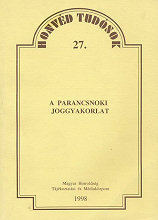
CLARK : War and society in the seventeenth century (fülszöveg)
Sir George Clark discusses war as a factor for good and ill in European society in the seventeenth century. In particular, he shows how war helped to determine the emergence of modern Europe from a society geographically, politically and doctrinally confused: what Sir George calls the mêlée of the early part of the century.
His first chapter stresses that war was accepted as part of the order of society. It was considered a legitimate instrument of policy, provided that it was just. Sir George then examines the analogy which is sometimes drawn with the duel, and shows how the duel came to be recognised as anti-social; it conflicted with the sole right of the State to take up arms. Hence it was controlled and eventually abolished, while war remained.
The next chapter examines 'War as a Collision of Societies', and analyses the effect on war of religious issues, questions of manpower, supply, and the relationship between trade and national policy (including some important remarks on the alleged nature of mercantilism). All these led to increasing control of the outbreak, the direction and purpose of war; a reduction of the mêlée.
'War in the European Community' examines the possibility of more civilized reactions to war—especially to atrocities. It shows some effects of war on the civilian populations, and the growth of agreed rules of conduct. It goes on to indicate how there can be discerned in the mêlée a European community of ordered nation-states, ruled mostly by international dynasties with a military governing class and professional fighting services—the whole regulated by a complex of treaties and trade.
The final chapters deal with particular aspects: the depredations of the Barbary Corsairs on the trade of civilized Europe, and the views held in the seventeenth century on the cycle of war and peace.